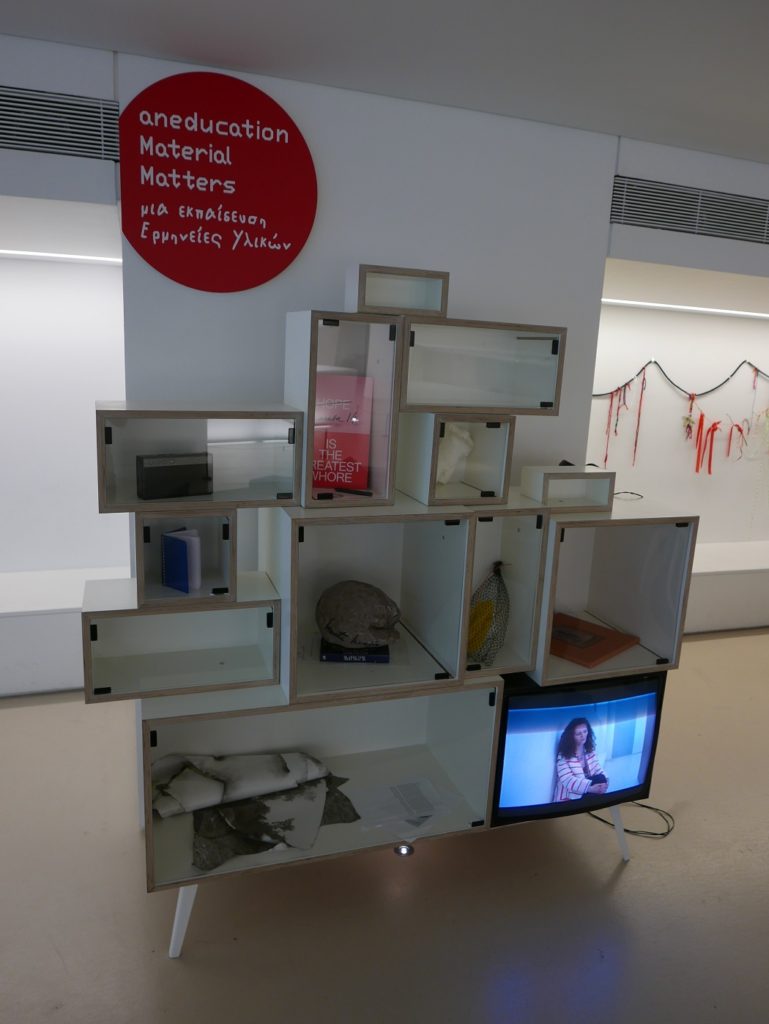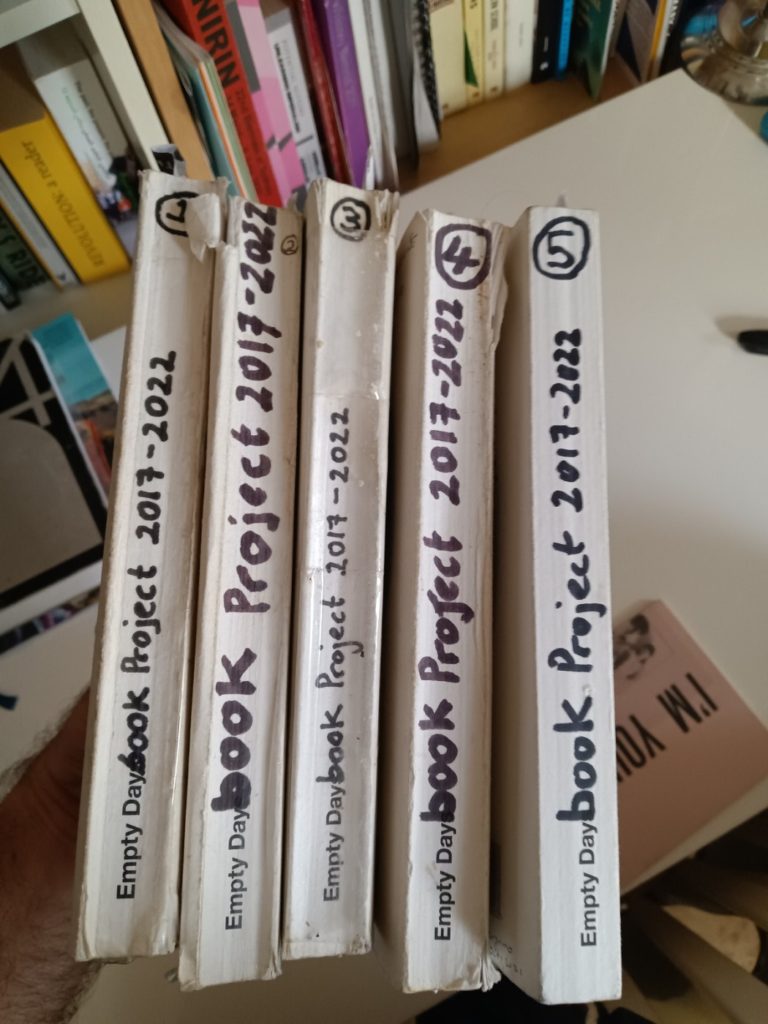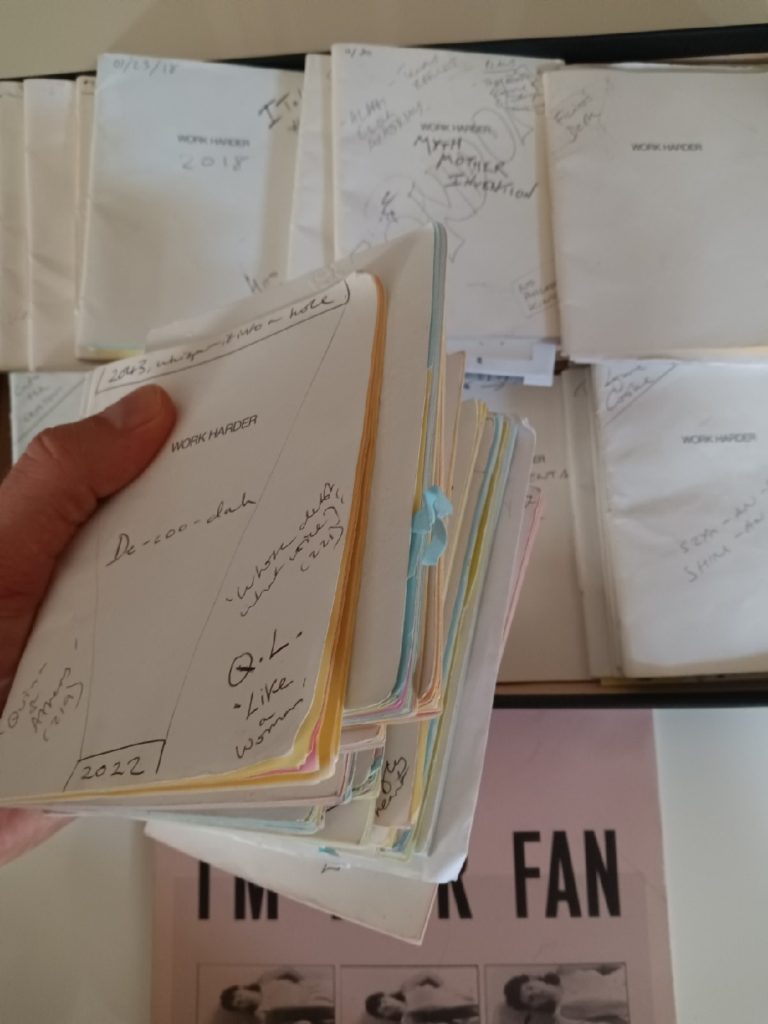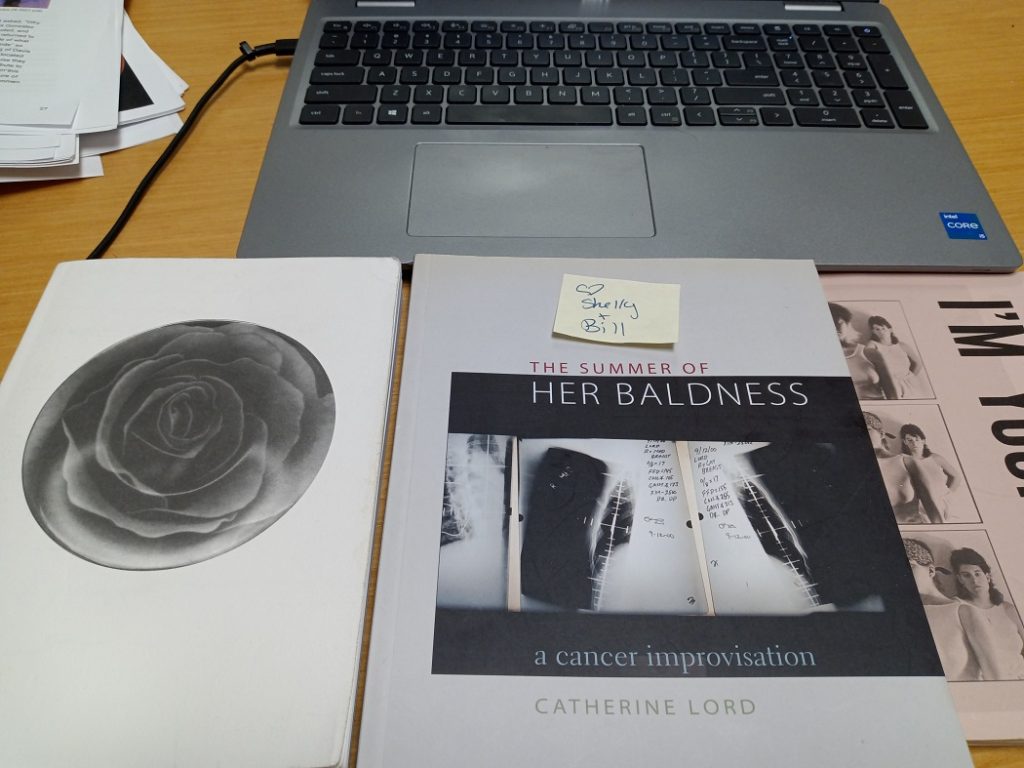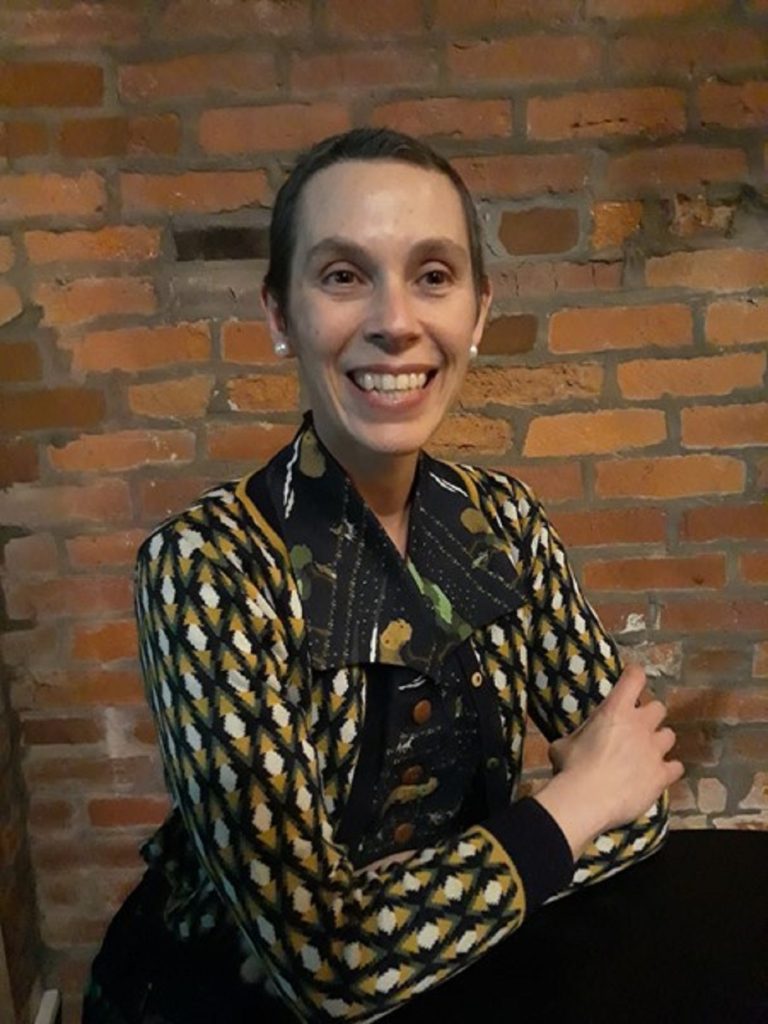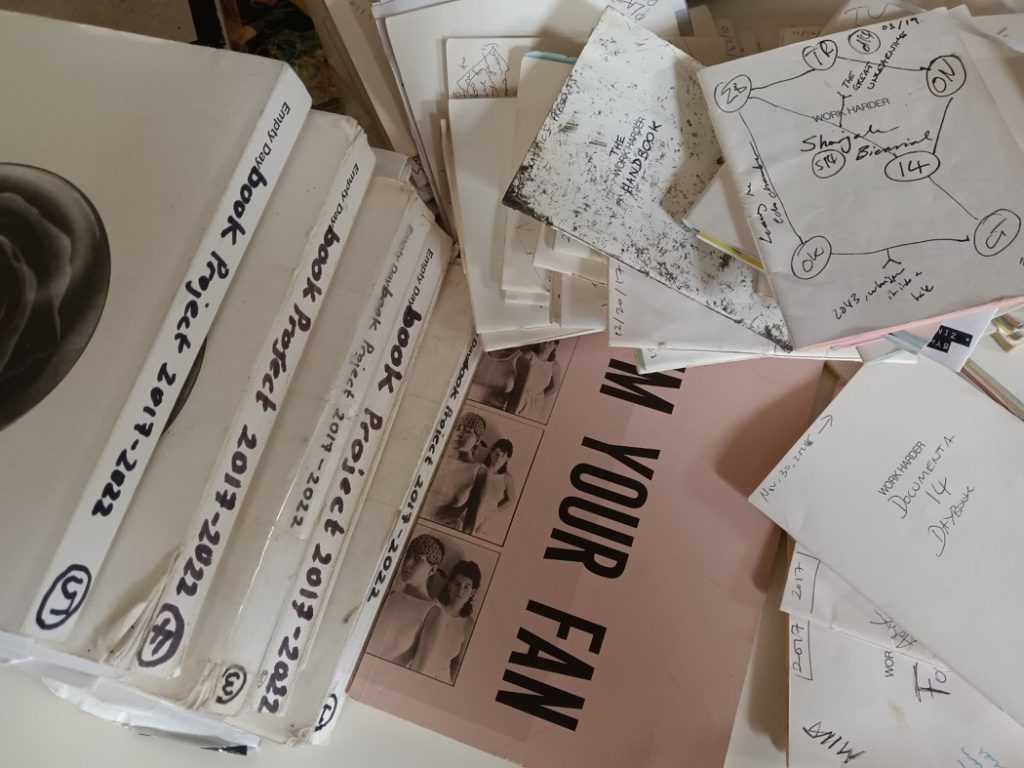With these dispatches steadily accumulating, as the books move from shelf to shelf or from shelf to bag to car to office to floor, I think it is time to reveal something that I have been holding back until now. My haunting of Lucius Fletcher’s living library – yes, that is now the name I will call my dear librarian by and, before you ask, yes, it is the name that I have given to him – goes beyond the book, as these shelves are stuffed full of other objects as well. There are the souvenirs gathered from various places over the years, ranging from sticks and rocks to curiosities bordering on artworks. They seem to be lying in wait for when someone wants to add them to a future Material Matters library!
These objects linger on the edges of shelves, stand guard at their peaks or are squirreled away in boxes couched at their feet. They too have their stories to tell and I know now that I am the ghost to tell them. While I was still alive, I thrummed with tales of speaking things – like Apuleius’ tall, talking tower or Herodas’ dildo, wait did that actually speak? Well, I have forgotten so many of them, but suffice to say the very idea of the book echoes forth from Phaedrus’ chattering trees (translated by our very own Dr. Strabo) and Persius’ hole of whispering rushes (hic tamen infodiam).
Piled up high and buried down below, old Loosh has placed his most book-like objects, his collection of filled diaries and notebooks, specifically the Empty Days diaries designed by Studio Lialios Vazoura of Christos Lialios and Katerina Vazoura and co-published by Cube Art Editions, and the Work Harder notebooks, by artist Lillianna Marie Baczeski.
Sure, notebooks are books, but at the same time they are not the books that occupy the heart of a library and this project. My evidence for this distinction is Moyra Davey’s presentation of one of her notebooks to the Material Matters Library as part of the aneducation program at documenta 14.
Moyra Davey
Material: NotebookEach time I open this notebook, I’m reminded of one from my childhood, even though I can’t precisely conjure the look or feel of that imagined one. It’s a strange sensation to be reminded daily of an object from the past, but be unable to place it in memory. Possibly there will be a Proustian moment where I’ll brush up against the thing that will finally reveal details and circumstances of the original notebook to me.
Closer to home, if you were to visit my grave – the large clear-plastic boxes of books in his basement that made up his CLASSICS LIBRARY (my caps) aka my former life – you wouldn’t find any book-like things buried there; any mementos have scattered to the corners of the basement or elsewhere. This means that my haunting is limited to the books on these shelves (which he happened to tidy up yesterday, somewhat to my frustration – it is easier to move through them when they are more loosely displayed, lying across each other, rather than tightly packed – sometimes I wonder whether the only reason I’m making him do this project is to give me some breathing room!). At the same time, today on this Moyra Monday, the book I chose from him, I’M YOUR FAN (her caps) – the slender pink volume containing a selection of Davey’s essays published as part of her 2014 exhibition at the Camden Arts Centre in London (Fletch’s old North London stomping ground) – reminded me of his stack of diaries and box of notebooks.
The first essay in the book, and one of the two essays left out of the more recent collection of essays Index Cards – which prompted last Monday’s post -, ‘Staying on Hue’ (originally commissioned and published by Cabinet magazine – and available to read in full here or on the image below) makes the following distinction between Davey’s notebooks and diaries:
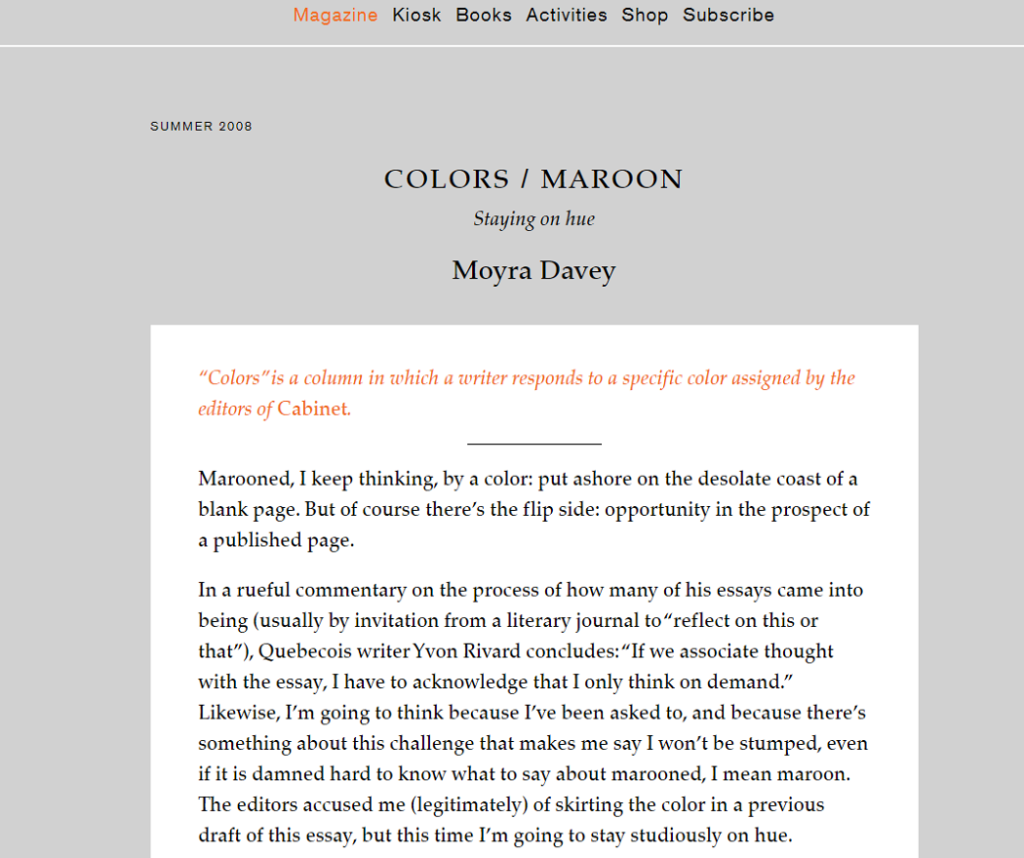
Apropos of notebooks and diaries: I’ve been finding that the small ones I routinely carry around in my purse or knapsack hold out a kind of promise, and can bring immense comfort and pleasure, whereas the larger diary books I’ve kept on and off since the early ’80s have come more and more to signal something ominous and soiled. The small notebooks are principally “idea notebooks” with stars to indicate something to come back to. The larger ones have a more ambiguous function: they contain starred ideas as well but also a fair amount of sludge. I’ve been trying to cut back on the sludge and have begun formatting entries as “bullets” and lists as a way of having the useful stuff be more visible. But the temptation to round up the events of the days dies hard.
The above-mentioned lavender-blue diary, even with its attractive cover, was beginning to feel particularly freighted. Here’s an extract from one of its last pages that sums up fairly well both the good and bad aspects of diaries and notebooks:
★ See small black notebooks: write about these friggin notebooks, love/hate relation. Compulsion to keep track of every damn thing. Fear of forgetting vs. how sick , how unhealthy, dirty, nauseating the whole project can begin to seem.
notebook = rag write about this
= a soiled handkerchief.
For an essay about colour (reinstated in I’M YOUR FAN in her and his shared Canadian-British spelling of the word) – not only the starring marron (…oops, I meant to type maroon), but also the cameo by lavender in these lines here – the whiteness of Empty Days and Work Harder feels out of place. Yet beyond their colour (or their lack of it) I have seen the way he too used to use these two books for different purposes, one placed in the pocket, the other in the backpack. Sadly, on leafing through them now, I realized he has no system of bullets or stars to negotiate the relationship between them or beyond them. His life streams through and across them, as boundless and messy as his scrawled handwriting (which even he cannot decipher!). Alongside entries on Minus Plato projects, initiated, carried through or abandoned, were notes on department meetings, visits to exhibitions, as well as doctor’s appointments during the time of his partner, Rebeka’s breast cancer diagnosis and treatment.
It is this latter form of entry, and not so much Davey’s reference to her notebooks and diaries, that brings me and these words he’s typing to your eyes today, dear Reader, to the way (and with whom) she ends her essay:
To return to the printed page: I’ve always wanted to write one of those “Top Ten” lists. Were I to do it now, I’d place at the summit Catherine Lord’s tour de force memoir The Summer of Her Baldness, devoured and cried over in the last few weeks while writing up these memories of my own. I love Lord’s book, subtitled “A Cancer Improvisation,” for many reasons, not the least of which is its diaristic, epistolary mode and her habit of drawing up lists, including one of a collection of hats and caps wherein the gift of a maroon fez is gratefully noted.
When Rebeka was going through (what an idiom! It only works if the portal is like a fire-rimmed door to the circle of hell!) her breast cancer treatment, their friend Shelly Casto gave them a copy of Lord’s book; a copy that Bill Horrigan (a good friend of Davey’s and the author of the essay on her work for the Camden Arts Center exhibition) had in turn shared with her as she went through her treatment. The book was sitting in his campus office this morning and before he sat down to type these words he opened it for the first time since Rebeka’s diagnosis, surgery, chemo, and radiation treatment. He flipped to the end and read:
Friday | February 14, 2003
(A LETTER TO HER BALDNESS)
Dear H.,
H is what I call you now, almost a year and a half after I thought I had seen you off to a good long hibernation.
On reading these words, my Lucius paused to think – it too had been over a year and half ago that Rebeka had finished the double-punch of chemo and radiation; a year and a half since the time of her Baldness (which she wore and bore with such style!).
He continued on and came to the following passage that seemed to spring right out of his library’s shelves and Davey’s essay:
You fade.
When I try to rouse you by looking at photographs of my homely skinny bald self, I can remember neither the cadence of your speech nor the confusions of your accent. (In fairness, when I page through the books with lavender covers and the word BREAST in the title that I accumulated during the period of my medical interventions, I cannot remember a word of what I read.)
While he tries to read on, his mind comes aground on the colour lavender – the same colour alluded to by Davey and cross-referenced in her essay. Here is the moment it first appears:
It’s fascinating and even a bit scary how this assignment is provoking a Proustian flow of involuntary memory. About a month ago on Cape Cod, like a swirl of smoke from the genie bottle, I began to recollect: “Two more notebooks survived for a while, maroon-backed ledgers like the ’57–’59 volume ….” Out of nowhere I’d called up Ted Hughes’s infamous mention of Sylvia Plath’s last two diary books, one of which he destroyed. I thought he’d said “maroon,” but doubted myself, wondering if they weren’t in fact blue, like the cover of the faux fin-de-siècle engraved lavender-blue notebook I’d been carrying around since May. But I was right, and it still amazes me that you can google “maroon-backed ledgers” and in two clicks be reading excerpts from Hughes’s introduction to the diaries.
As he closes the book and commits himself to return it to Bill (using an email with this post’s URL included), he doesn’t really know how to bring this post to an end. Like a cancer diagnosis, there is no neat ending to this story. After surgery, chemo, radiation, may come the years of anti-hormone treatment, doctor appointments, scans and the constant fear of its revenant. I may haunt his library, but I ‘live’ with this other haunting too. I know that this is not his tale alone to tell, as like those diaries and notebooks, it folds on into lives lived together. And as for theirs stars? Perhaps now is the time and this is the place to add them.
